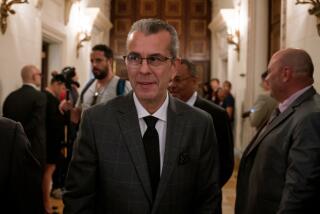The Karzai question
As President Obama weighs the military’s request for up to 40,000 more U.S. troops in Afghanistan, election officials in the capital city of Kabul are combing through a sampling of more than 350 suspect ballot boxes for signs of fraud significant enough to have given President Hamid Karzai the majority he needed to win reelection without a runoff. The two issues cannot and should not be separated. No matter how many additional troops the United States and NATO send to Afghanistan, or which strategy Obama decides to employ against the Taliban and its Al Qaeda allies, it cannot succeed without an Afghan government that is seen as legitimate by the people. And that legitimacy depends to a large degree on the election results.
Even Karzai has acknowledged some fraud in the Aug. 20 vote, although he insists it was not significant. But the question of how much fraud -- and how to respond to it -- has divided the powerful United Nations mission in Afghanistan and last week cost former U.S. diplomat Peter W. Galbraith his job as the second-highest-ranking U.N. official there. Galbraith was fired after accusing his former boss, U.N. special representative Kai Eide, of blocking efforts to limit fraud ahead of the vote and then playing it down after the fact to avoid inflaming tensions. Eide, a Norwegian diplomat, has denied the allegations, saying he was adhering to the Afghan Constitution and election law. The leading challenger, Abdullah Abdullah, meanwhile, has accused the U.N. and election officials of backing Karzai, who was said to have won 54.6% of the vote, according to the preliminary results.
The vote audit is being carried out by the Electoral Complaints Commission, made up of Afghan and international members. They are reviewing a representative sample of the nearly 4,000 polling stations that are believed to have had questionable results, such as a turnout of more than 100% or more than 95% of the votes cast for one candidate. The commission, in turn, will report to the government-appointed Independent Electoral Commission, which will rule on whether the fraud was sufficient to warrant a runoff.
U.N. and U.S. officials must remain vigilant throughout this process to ensure that it is resolved urgently and honestly. Every day that passes diminishes Afghans’ faith in the election results. If necessary, the United States has to be prepared to consider new elections or a transition government.
More to Read
Sign up for Essential California
The most important California stories and recommendations in your inbox every morning.
You may occasionally receive promotional content from the Los Angeles Times.










